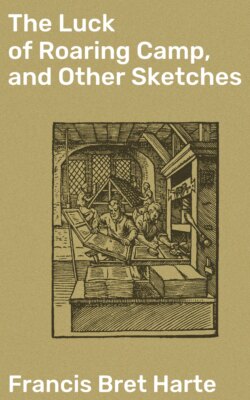Читать книгу The Luck of Roaring Camp, and Other Sketches - Francis Bret Harte - Страница 3
На сайте Литреса книга снята с продажи.
ОглавлениеThe Luck of Roaring Camp, and Other Sketches
Table of Contents
PREFACE.
Table of Contents
A SERIES of designs—suggested, I think, by Hogarth's familiar cartoons of the Industrious and Idle Apprentices—I remember as among the earliest efforts at moral teaching in California. They represented the respective careers of The Honest and Dissolute Miners: the one, as I recall him, retrograding through successive planes of dirt, drunkenness, disease, and death; the other advancing by corresponding stages to affluence and a white shirt. Whatever may have been the artistic defects of these drawings, the moral at least was obvious and distinct. That it failed, however—as it did—to produce the desired reform in mining morality may have been owing to the fact that the average miner refused to recognize himself in either of these positive characters; and that even he who might have sat for the model of the Dissolute Miner was perhaps dimly conscious of some limitations and circumstances which partly relieved him from responsibility. "Yer see," remarked such a critic to the writer, in the untranslatable poetry of his class, "it ain't no square game. They've just put up the keerds on that chap from the start."
With this lamentable example before me, I trust that in the following sketches I have abstained from any positive moral. I might have painted my villains of the blackest dye—so black, indeed, that the originals thereof would have contemplated them with the glow of comparative virtue. I might have made it impossible for them to have performed a virtuous or generous action, and have thus avoided that moral confusion which is apt to arise in the contemplation of mixed motives and qualities. But I should have burdened myself with the responsibility of their creation, which, as a humble writer of romance and entitled to no particular reverence, I did not care to do.
I fear I cannot claim, therefore, any higher motive than to illustrate an era of which Californian history has preserved the incidents more often than the character of the actors—an era which the panegyrist was too often content to bridge over with a general compliment to its survivors—an era still so recent that in attempting to revive its poetry, I am conscious also of awakening the more prosaic recollections of these same survivors—and yet an era replete with a certain heroic Greek poetry, of which perhaps none were more unconscious than the heroes themselves. And I shall be quite content to have collected here merely the materials for the Iliad that is yet to be sung.
San Francisco, December 24, 1869.
